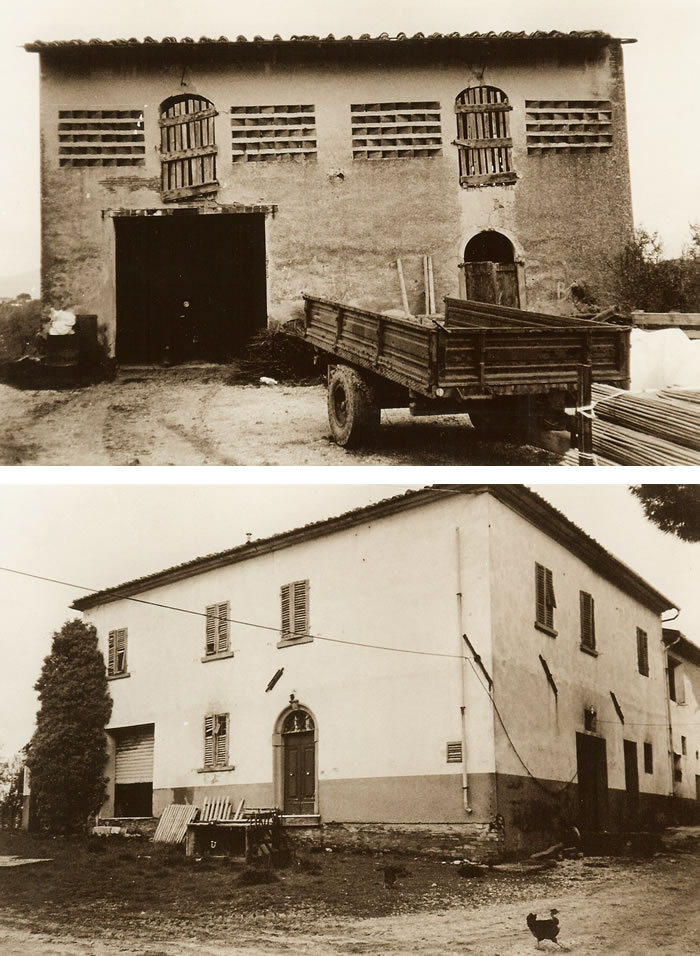Musignano
The name "Musignano" is of Roman origin (around V-VI century) and indicated a settlement, probably from the name of a landowner, organised like a manorial centre that managed the lands of the fertile hills on which it was located.
A document dated 780 mentions a church of San Quirico a Musignano, to satisfy the community's piety and Christian devotion. It is also the first documentary evidence of Cerreto in medieval papers. The court of Musignano was located on one of the main communication roads that linked the mid Valdarno with Mount Albano and overlooked an important waterway: the "Padule".
For this reason this area was very coveted by two large feudal families, first the Cadolingi counts, then the Guidi counts, who turn it into a fortified settlement.
With the death of Ugo III, the last descendent of the Cadolingis, in 1113, the Guidi counts, already masters of the castles of Cerreto, Vinci and Larciano, thanks to which they dominated the westernmost road of Mount Albano, take possession of the castle. These possessions are confirmed by the Swabian emperors until the middle of the III century, with the expansion of the municipality of Lucca, which takes possession of Fucecchio, and of the municipality of Florence.
In fact, The Guidi family sells the majority of their possessions and castles, including Empoli, Vinci, Petroio, Cerreto and Musignano.
The name "..corte Musignano" appears on the Guidi counts' bill of sale of 1255. The sale is reconfirmed and becomes definite in 1273.
From this moment on, the territory becomes part of the Florentine countryside, even though it belongs to the diocese of Lucca. With time we see the expansion of Stabbia in the flat area, where the Medicis, interested in hunting, fishing and the reclamation of the plain, reorganise the territory, following a by now consolidated villa and farm system.
The works realised in the lake basin affected the territory, above all expanding and developing fishing activity, drawing a considerable migratory flow even from far away lands. Today Musignano rises in a dominant position at the centre of a prestigious naturalistic area.
The name "Musignano" is of Roman origin (around V-VI century) and indicated a settlement, probably from the name of a landowner, organised like a manorial centre that managed the lands of the fertile hills on which it was located.
A document dated 780 mentions a church of San Quirico a Musignano, to satisfy the community's piety and Christian devotion. It is also the first documentary evidence of Cerreto in medieval papers. The court of Musignano was located on one of the main communication roads that linked the mid Valdarno with Mount Albano and overlooked an important waterway: the "Padule".
For this reason this area was very coveted by two large feudal families, first the Cadolingi counts, then the Guidi counts, who turn it into a fortified settlement.
With the death of Ugo III, the last descendent of the Cadolingis, in 1113, the Guidi counts, already masters of the castles of Cerreto, Vinci and Larciano, thanks to which they dominated the westernmost road of Mount Albano, take possession of the castle. These possessions are confirmed by the Swabian emperors until the middle of the III century, with the expansion of the municipality of Lucca, which takes possession of Fucecchio, and of the municipality of Florence.
In fact, The Guidi family sells the majority of their possessions and castles, including Empoli, Vinci, Petroio, Cerreto and Musignano.
The name "..corte Musignano" appears on the Guidi counts' bill of sale of 1255. The sale is reconfirmed and becomes definite in 1273.
From this moment on, the territory becomes part of the Florentine countryside, even though it belongs to the diocese of Lucca. With time we see the expansion of Stabbia in the flat area, where the Medicis, interested in hunting, fishing and the reclamation of the plain, reorganise the territory, following a by now consolidated villa and farm system.
The works realised in the lake basin affected the territory, above all expanding and developing fishing activity, drawing a considerable migratory flow even from far away lands. Today Musignano rises in a dominant position at the centre of a prestigious naturalistic area.




